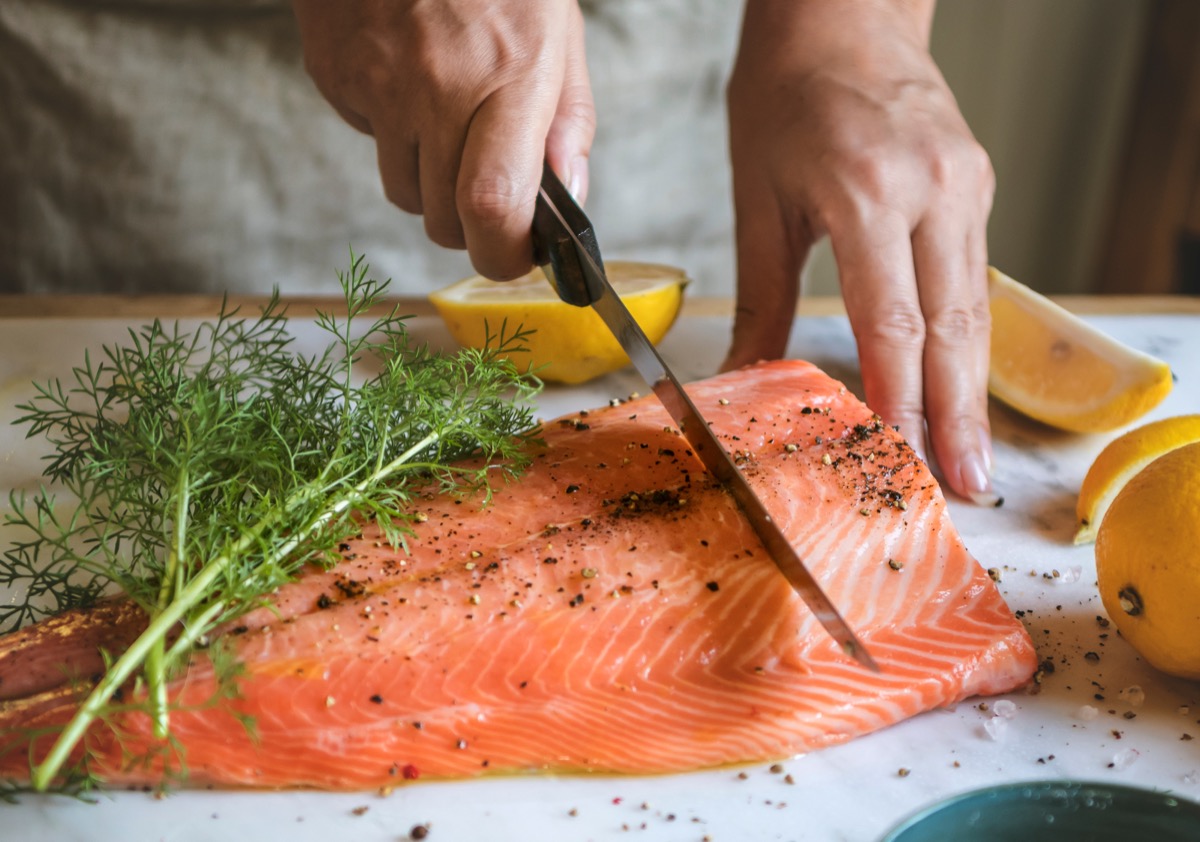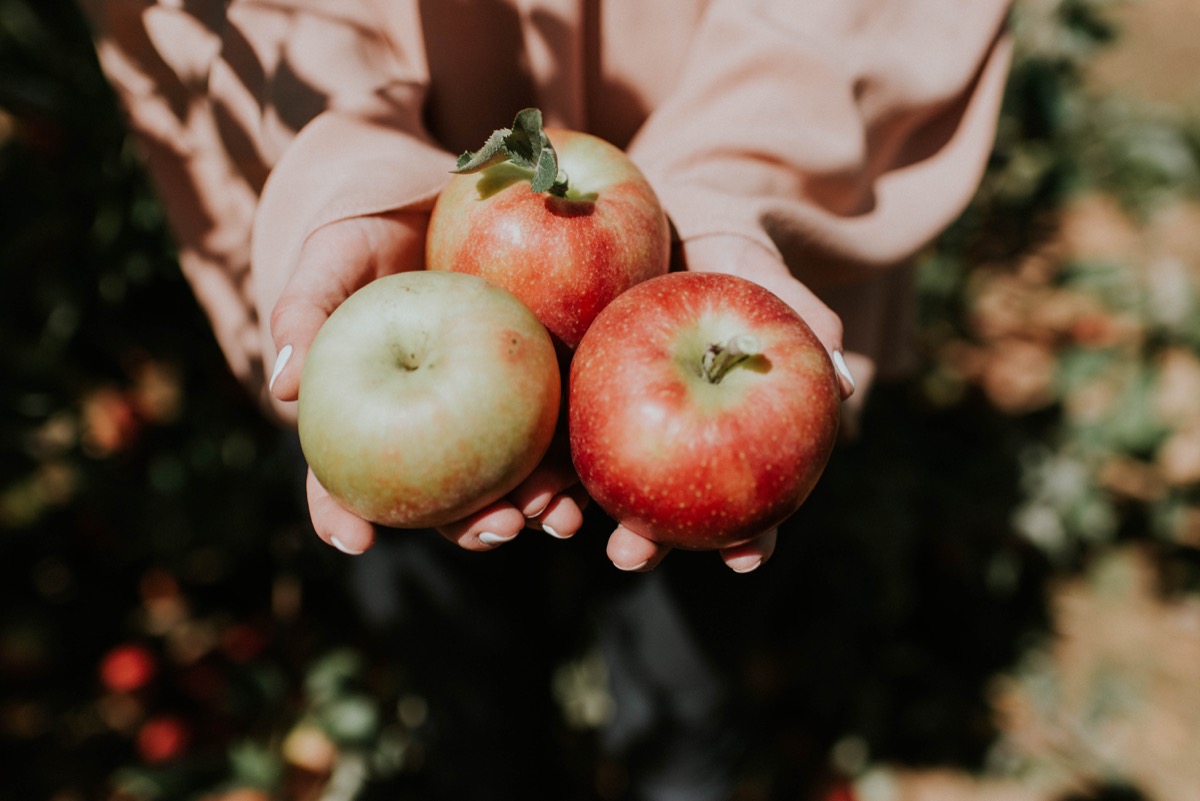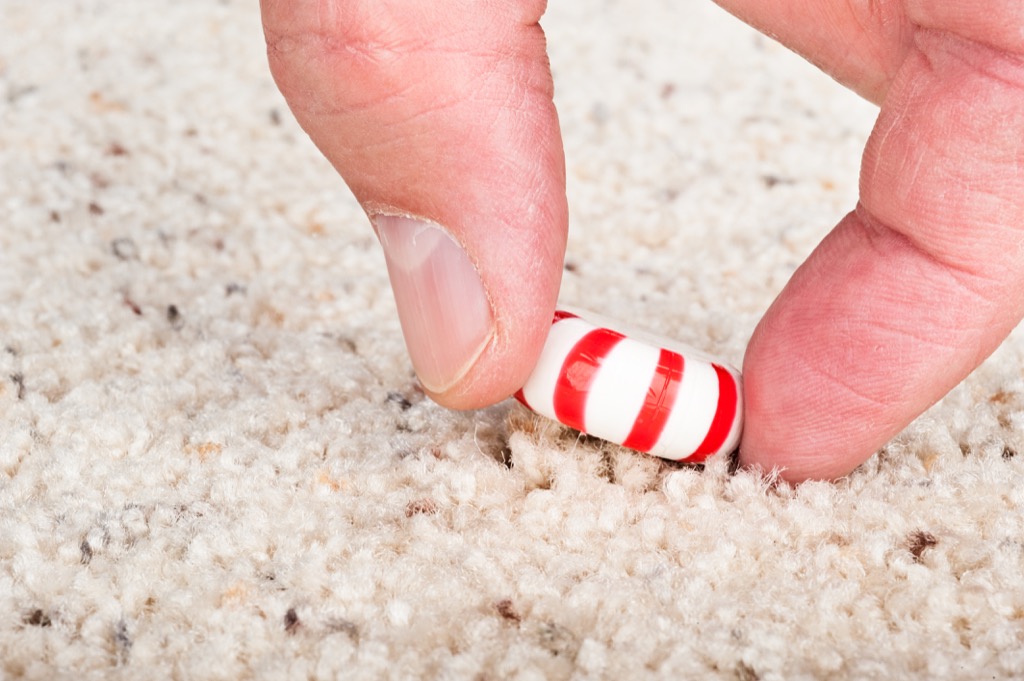55 Facts So Interesting You’ll Kick Yourself for Not Knowing Them

No matter how knowledgeable you are, there are bound to be more than a few facts you’ve yet to learn. And while some are no doubt useless and obscure, others are so jaw-droppingly awesome you’ll wonder how you ever lived without knowing them. Honestly, how is it not common knowledge that your tonsils can grow back? Or that Queen Elizabeth has had the same body-double for 30 years? If you’re already freaking out over these mind-boggling tidbits, then read on to find more interesting facts you’ll kick yourself for not knowing.
1
There’s no proof that sugar makes you hyper.

Despite what your parents might have told you, there’s no scientific proof that sugar makes you hyper. In fact, one 1995 review of studies on the topic that was published in the Journal of the American Medical Association concluded that sugar “does not affect the behavior or cognitive performance of children” and that “the strong belief of parents may be due to expectancy and common association.” Since then, there’s been no research to disprove that conclusion.
2
There are only 18 minutes of action in the average baseball game.

Baseball is all about building suspense. But if the pace seems rather slow to you, it’s because there are only 18 minutes of actual action in the average three-hour game, according to the The Wall Street Journal. No wonder there’s so much time for hot dogs and Dippin’ Dots; 90 percent of your time at the stadium is spent waiting for something to happen.
3
Farm-raised salmon is dyed pink.

Unless you only eat wild salmon, then the fish you buy has likely been dyed pink. That’s because farm-raised salmon consume a different diet than their ocean-dwelling counterparts and are naturally white instead of blush. In order to make them the expected color, a chemical is added to change their hue. “If we didn’t do it, customers wouldn’t buy it,” fish farmer Don Read told Time magazine. “Consumers buy what they’re familiar with. They won’t go into the store to buy white salmon.” And for more fun trivia, check out the 50 Feel-Good Facts to Cure Quarantine Boredom.
4
The word “mafia”” is never said in The Godfather because of the actual mafia.

The Godfather is all about the mafia, which is why it may surprise you to learn that the word “mafia” is never actually said in the film—and there’s a good reason for that. Back in the ’70s, when the movie was being made, those who were involved in organized crime weren’t keen on the idea of a film that could make them look bad.
When Paramount Pictures announced the project, the Italian-American Civil Rights League (which was led by Joseph Colombo, boss of the Colombo crime family) launched an intimidation campaign to keep those working on the film in line. “There were major threats, they were serious,” Gianni Russo, an actor who appeared in the film and had real-life mob connections, told ShortList. Fortunately, both the producers and the mob were able to make a deal: the show could go on as long as all mentions of “mafia” were deleted from the script.
5
“Frito feet” is the term for when your dog’s paws smell like corn chips.

If your dog’s paws smell like corn chips, you’re not alone—or rather, your dog is not alone. “Frito feet” is the weirdly apt term for this stinky situation, which is caused by the combination of yeast (which occurs naturally on your pup’s paws) and bacteria (specifically pseudomonas and proteus bacteria, which arrive via soil and water), according to Colorado-based veterinarian Robert J. Silver, DVM. Don’t worry—it’s typically harmless. And for more dog facts, check out the 20 Amazing Facts You Never Knew About Your Dog.
6
Tonsils can grow back after being removed.

If you’ve ever had your tonsils removed, you probably assumed it was an experience that you’d never have to repeat. But as strange as it sounds, tonsils can actually grow back, according to the experts at Very Well Health. If your surgeon didn’t completely remove all of the lymphoid tissue during your tonsillectomy (the procedure where tonsils are removed), then the tissue that gets left behind can regenerate.
7
Cats and dogs can be allergic to humans.

Unfortunately, some people are allergic to cats and dogs. But it’s also true that some of pets find humans just as intolerable. “It’s rare, but dogs can be allergic to cat dander and people dander and vice versa,” Raelynn Farnsworth of Washington State University’s College of Veterinary Medicine, told National Geographic.
Dogs’ symptoms will often appear as skin inflammation and itching as well as sneezing and a runny nose, while cats may suffer from miliary dermatitis, which reveals itself through missing fur, as well as scabs on your kitty’s skin. Luckily, if your pet is allergic to you, you can help them out with allergy shots or oral drops.
8
Ashtrays are required on airplanes even though you can’t smoke.

Everyone knows that smoking is not permitted when you board an airplane. After all, U.S. airlines started banning smoking back in the ’80s. However, people are known to break rules—which, according to Time magazine, is why the Federal Aviation Administration requires ashtrays on all aircrafts. This is to prevent any rule-breakers from using the lavatory waste bin, which is likely to be filled flammable tissues, to dump their cigarettes.
9
Canada’s lowest recorded temperature was colder than Mars.

It’s no secret that it can get mighty cold in some parts of Canada, but who knew that our neighbor to north could get as chilly as Mars? The lowest recorded temperature in the country’s history happened on Feb. 3, 1947, at Snag Airport—approximately 18 miles east of the Alaska-Yukon border. It dropped to a bone-chilling -81.4° Fahrenheit, which is one degree colder than the -80° Fahrenheit average temperature of Mars, according to NASA. If you were wondering, the average temperature on Earth is 57° Fahrenheit.
10
Birds don’t urinate.

According to the National Audobon Society, “unlike mammals, [birds] don’t produce urine. Instead, they excrete nitrogenous wastes in the form of uric acid, which emerges as a white paste.” The animals also don’t have a urethra, so that paste leaves out their bums.
11
Holland is not a country.

Holland is a lovely part of the world with a long and proud history—but it’s not a country. Even though many people think it is a nation unto itself, and despite the fact that it’s often used to refer to the country where it’s located, Holland is, in fact, a region comprised of two of the 12 total provinces in the Netherlands.
12
Queen Elizabeth II has had the same body-double for 30 years.

You’ve probably never heard of Ella Slack, but you may have seen her. For 30 years, she’s been Queen Elizabeth’s body-double. Before the monarch appears at large events, Ella walks, stands, and sits everywhere the Queen will in order to make sure everything is set up perfectly. She also makes sure that the royal will be comfortable and that photographers will have a clear view of her. Ella even dresses like the Queen for rehearsals, but due to strict royal rules, she’s required to squat over the throne instead of actually sit on it.
13
Froot Loops are all the same flavor.

Unlike Skittles and gummy bears, the color of each individual Froot Loop doesn’t matter that much—and that’s because they all taste the same. Food Beast even conducted a taste test to check. “Each loop does in fact taste like mildly sweetened cardboard, with negligible or no differences between them,” they wrote.
14
Shooting stars aren’t stars.

When you see a shooting star, you should absolutely make a wish—as long as you can ignore the fact that what you’re seeing isn’t actually a star, that is. According to the California Institute of Technology, the streaks we see flying through space are instead rocks or dust that are hitting the Earth’s atmosphere. Because they’re moving incredibly fast, they heat up and glow brightly in the sky, which is why you can sometimes spot them.
15
A “cumberground” is a useless person or thing that just gets in the way.

When there’s something—or someone—that’s always caught underfoot and isn’t adding any value to a situation, you can call them a “cumberground.” It does sound a little bit nicer than using another adjective—one like “annoying,” perhaps.
16
You can live without 45 percent of your body.

Theoretically, you can lose around 45 percent of your body and still survive. The BBC’s Science Focus breaks it down, saying that you can go on “without one of your lungs, a kidney, your spleen, appendix, gall bladder, adenoids, tonsils, plus some of your lymph nodes, the fibula bones from each leg and six of your ribs.” That’s in addition to your limbs, eyes, nose, ears, larynx, tongue, lower spine, and rectum—though life without these parts sounds pretty grim. With medications or artificial replacements, you could even potentially even ditch your stomach, colon, pancreas, salivary glands, thyroid, and bladder.
17
Pruney fingers caused by wetness may exist to help humans grip things.

When you enjoy a long bath, you’ll surely notice that your fingertips shrivel up like prunes. And while you might assume that this occurs because your skin has absorbed so much water, that’s not the case. Instead, the blood vessels inside of your fingertips contract, which makes your skin pucker. Scientists also told The Guardian they believe the wrinkles are likely a result of evolution and once helped our ancestors grip their tools and food while foraging in wet areas.
18
You’re more productive in warmer spaces.

It’s not just in your head: Your focus does suffer when you’re freezing cold. In fact, a 2004 study from Cornell University found that raising an office’s temperature from 68° to 78° reduced typing errors by 44 percent and raised output by 150 percent.
19
Nutmeg is a hallucinogen when ingested in large quantities.

The popular holiday spice is also a hallucinogen. That’s because nutmeg contains myristicin, which is a compound that has mind-altering effects that can last one to two days. However, Jeffrey Bernstein, MD, medical director at the Florida Poison Information Center at Jackson Memorial Hospital, explained to ABC News that it’s dangerous to ingest too much of the spice. “Most people only try it once because they have such nasty side effects,” he says, noting that they can include nausea, vomiting, and diarrhea. “The rewards are not worth the risks.”
20
More than 95 percent of passengers involved in plane crashes survive.

If you have a fear of flying, it may be hard to convince you that plane crashes aren’t necessarily as deadly as you might think. Although it’s incredibly tragic when lives are lost, the fact is that more than 95 percent of passengers involved in aviation accidents survive. The National Transportation Safety Board even took a look at accidents that occurred between 1983 and 2000 involving more than 53,000 passengers and found that 51,207 made it out alive.
21
A woman was elected to Congress before women could vote.

Jeannette Rankin made history on Nov. 7, 1916, when she became the first woman elected to the United States Congress. What makes this even more remarkable is that the Montana politician earned her seat before women even had the right to vote. The 19th amendment, which saw women finally heading to the polls, was passed on June 4, 1919, and was ratified on Aug. 18, 1920.
22
Pumas, panthers, cougars, and mountain lions are all the same animal.

Despite having different names, pumas, panthers, cougars, and mountain lions are all the same animal, explains the San Diego Zoo. The various monikers merely exist because people in different parts of the world gave these cats different names. The creature is also known as the katalgar in Cree, and ko-icto in the Chickasaw language. Early Americans commonly called them catamounts or carcajou.
23
Every ear of corn has an even number of rows.

According to the Torrey Botanical Society, the even number is due to the fact that “the spikelets in all parts of the maize plant are borne in pairs.” And when you’re counting by twos, you’ll always land on an even number.
24
The part of your back you can’t reach is called the “acnestis.”

Go ahead and try to scratch your back. While you may be able to touch a few spots as you bend your arm around your body, there’s a part of your back between your shoulder blades that you likely won’t be able to reach. That area is called “acnestis” which comes from the Greek word for cheese-grater.
25
Aspirin works fastest when you chew it.

The fact that aspirin can help in the case of a heart attack could be life-saving information. Even more helpful, is knowing that it’s more effective when chewed, not swallowed, in this particular situation. By breaking down the pill in your mouth, it’s able to work faster in the body, according to Harvard Medical School. One study even found that chewed aspirin took just five minutes to start working, while swallowed aspirin took 12.
26
Many of Shakespeare’s plays were based on older stories.

William Shakespeare may be responsible for writing some of history’s most well-known works of literature, but that doesn’t mean his ideas were one of a kind. In fact, many of his stories were based on old English and Latin plays, poems, and other written works. According to the British Council, King Lear and Cymbeline both “relied heavily” on Holinshed’s Chronicles of England, Scotland, and Ireland, and Shakespeare merely added an extra set of twins to Plautus’ The Brothers Menaechmus to come up with The Comedy of Errors. Even Romeo and Juliet is based on a translation of an Italian folktale that the Bard had come across.
27
Scientists think people might be aware of their death after they die.

Sam Parnia, PhD, director of critical care and resuscitation research at NYU Langone School of Medicine in New York City, took a look at people who had technically died (their heart had stopped beating and blood had stopped circulating to their brain) before being successfully revived. According to The Independent, Parnia found that some people reported that they were aware of what was happening after they had died, including being able to hear full conversations and seeing the activity going on around them. The study concluded that people may be “aware they’re dead because their consciousness continues to work after the body has stopped showing signs of life.”
28
You can get pregnant while you’re already pregnant.

Or at least in some cases, you can. According to BBC News, that’s what happened to Arifa Sultana, a 20-year-old woman in Bangladesh who gave birth to a baby boy in February and then a pair of twins 26 days later. Sultana was previously unaware of the fact that she has uterus didelphys, which means that she was born with two uteruses. Sultana and her twins were released from the hospital four days after the mother had undergone a C-section to deliver them. According to her doctor, the mother and all three babies are healthy.
29
Albert Einstein thought it was hilarious people believed he flunked math.

You may have heard that famous genius Albert Einstein failed math in school as a child, but that’s not true. According to Time magazine, Einstein himself disputed the falsehood in 1935 when he was presented with a Ripley’s column that made the claim. He apparently laughed, saying, “I never failed in mathematics. Before I was 15, I had mastered differential and integral calculus.” He also explained that in his younger years he was “far above the school requirements” in math, which put him at the top of his class.
His sister backed that up, saying that by 12, “he already had a predilection for solving complicated problems in applied arithmetic,” and his parents even bought him advanced textbooks so that he could learn geometry and algebra on his own during summer vacation.
30
A dollar is worth more in some states than others.

One Tax Foundation study found that the real value of a dollar can vary as much as $32 from state to state. Mississippi is the state where you’ll get the most bang for your buck ($100 there has a real value of $116) and Hawaii is the state where you’ll get the least ($100 there has a real value of $84).
31
More people waste their gym memberships than you think.

It’s common knowledge that gyms make most of their money from people who pay for a membership and don’t go. But can you guess how many people do that? According to University Hospitals, it’s 67 percent, and that that number is even higher among people who sign up in the New Year’s rush around January.
32
Vending machines might be deadlier than sharks.

There’s no doubt that sharks are scary, but perhaps you should be more afraid of vending machines. According to the U.S. Consumer Product Commission, there were 37 known vending machine fatalities between 1978 and 1995, which means there were an average 2.18 vending machine deaths each year. In comparison, according to National Geographic, the U.S. only averages one shark-attack fatality every two years.
33
You can perform the Heimlich maneuver on yourself.

If you’re ever alone and find yourself choking on a piece of food, don’t panic! Instead, try to stay calm and remember that you can perform the Heimlich maneuver on yourself. First, form a fist with your dominant hand and position it under your ribcage and above your belly button with your other hand flat on top. Then, forcefully push your fist in and up repeatedly until the item in your throat comes loose. If that doesn’t work, try doing the same thing while bending yourself forcefully over a chair and allow it to add extra pressure to your hand, the U.S. National Library of Medicine recommends.
34
Fruit snacks are made shiny using the same wax used on cars.

Fruit snacks typically include ingredients like sugar, corn syrup, modified corn starch, and juice. But among the gelatin and dye, there’s also carnauba wax. If you don’t know what that is, it’s the stuff that makes the snacks (and lots of other candies) glossy—and also the stuff you use to shine your car.
35
Dogs prefer people who are generous.

Surely we all want our dogs to love us as much as we adore them. But it turns out that pups may not be as warm if you’re a bit selfish. Researchers at the University of Milan had dogs watch as certain people shared food with someone in need and others rejected the request for help. When the same people then called the dogs to them, the pups “overwhelmingly trotted over to the generous people.”
36
A single cloud can weigh 1.1 million pounds.

No matter how light and fluffy those cumulous clouds may look, they’re actually pretty heavy. In fact, according to the U.S. Geological Survey, researchers have found that a single cloud weighs about 1.1 million pounds. Scientists learned that by taking the water density of a cloud and multiplying it by its volume.
37
“Columella nasi” is the space between your nostrils.

If you place your finger on that tiny bit of skin between your nostrils at the bottom of your nose, you’re touching your columella nasi. Or, as the Free Dictionary puts it, “the fleshy external termination of the septum of the nose.”
38
The forbidden fruit in the Bible was never specifically an apple.

Christian children are typically taught that when Adam and Eve lived in the Garden of Eden, they were tempted by an evil snake with an apple. And while the forbidden fruit is mentioned in the Bible, it never says anything about an apple. Some believe the prohibited snack was more likely a fig or a pomegranate, or maybe even grapes, olives, apricots, or grapefruit
39
The world produces more than 1.5 times enough food to feed everyone on the planet.

Although the United Nations doesn’t expect the world’s population to reach 10 billion until 2050, we already produce enough food to feed that many people. According to the Food and Agriculture Organization of the United Nations, that means there’s already 1.5 times enough food to feed everyone in the world.
40
You can’t taste food unless it’s mixed with saliva.

Sugar is sweet, lemons are sour, and ginger is bitter—but you wouldn’t know any of that if your mouth was overly dry. That’s because, according to a pivotal 2000 study from Critical Reviews in Oral Biology & Medicine, you can’t taste food unless it’s mixed with saliva. It’s only when the food is dissolved in the liquid in our mouths that the chemicals can be picked up by the receptors on our taste buds.
41
You can use hand sanitizer as emergency deodorant.

If you ever leave home without deodorant and find yourself rather sweaty, then check to see if there’s any hand sanitizer around. While it’s not a long-term solution, hand sanitizer can be used in place of deodorant if you’re in a pinch. “Sweat itself is odorless, but when it’s broken down by bacteria on the skin, an unpleasant odor is released,” Joshua Zeichner, an assistant professor of dermatology at Mount Sinai Hospital in New York City, told Allure. “The alcohol content in vodka and other alcoholic beverages helps kill bacteria on the skin, including bacteria under the arms responsible for body odor.” Hand sanitizer, which contains approximately 60 percent alcohol, works the exact same way.
42
Flamingos bend their legs at the ankle.

Flamingos are adorably kitschy creatures who charm us with their bright pink feathers and synchronized snazziness. But what makes the American flamingo even quirkier, according to the National Aviary, is the fact that they actually stand on their tip-toes. That means it’s not their knees that are bending backward but their ankle. Their knee is tucked up underneath their feathers near their body.
43
The king of hearts is the only king in a deck of cards without a mustache.

You’ve probably been playing cards your entire life and never noticed this. But if you look closely, you’ll see that the king of hearts is the only monarch who doesn’t have a mustache. According to The Guardian, he mistakenly lost his ‘stache in a redesign.
44
Food tastes fundamentally different on an airplane.

There may be a very good reason why you’re not a fan of airplane food. While it might not be the same kind of cuisine you’d find at a five-star restaurant, the food you eat up in the sky faces a few different challenges when it comes to pleasing your palette. The cool, dry air on the plane, as well as the lower oxygen levels in pressurized cabins, affects the olfactory receptors you need to taste your food.
“Low moisture and air movement will dry the nasal passages and this reduces odor and taste sensitivity,” nutritionist Herbert Stone, PhD, told CNN. Stone added that meals eaten at sea level “will be rated as stronger and more intense” than food eaten on a plane.
45
Your stomach can’t digest gum at all—let alone after seven years.

Growing up, you may have been told that you should never swallow gum because it will stay in your stomach for seven years. And while that sounds dire enough, it’s a myth. It remains true that you shouldn’t swallow your gum, but the reason is because your body can’t digest gum at all. Though some of the components can be broken down in our system, the rubber-like base is indigestible, for the most part.
However, you don’t have to worry about gum sticking around in your system forever. Pediatric gastroenterologist David Milov, MD, told Scientific American that gum “probably passes through slower than most foodstuffs, but eventually, the normal housekeeping waves in the digestive tract will sort of push it through.”
46
A study suggests that Earth had two moons that crashed to form one.

The moon that shines above Earth has inspired countless myths and poems and even prompted members of human race to leave our planet. But you have to wonder how our view of the night sky would change if we had two moons, which a 2011 Nature study suggests was once the case. Scientists suspect that there used to be a small second moon that orbited our planet before crashing into the bigger moon (the one we know). This explanation could be why the two sides of the moon are very different.
47
There is no such thing as an alpha wolf.

It has long been suggested that a pack of wolves is lead by the top male who is known as an alpha wolf. Apparently, that’s not the case. Gizmodo confirms that while there are a lead male and female in each pack, there is no alpha male as we’ve come to know it. According to the Canadian Journal of Zoology, a wolf pack operates more like a family, “with the adult parents guiding the activities of the group in a division-of-labor system.”
48
Tryptophan in turkey does not make you sleepy.

It’s not unusual to need a nap after eating a delicious Thanksgiving dinner, but it’s not the tryptophan in turkey that’s making you so sleepy. While many of us believe that it’s the chemical in the bird that makes us want to doze off after indulging in a large plate of white and dark meat, that’s a holiday-related myth. Plenty of other foods have just as much tryptophan in them as turkey—in fact, cheddar cheese contains even more tryptophan. According to experts, it’s more likely the large amounts of carbohydrates and alcohol that you consume during dinner that forcer your body into a much-needed state of rest.
49
The five-second rule should actually be the half-second rule.

When you drop a piece of food on the ground, you might think that if you pick it up with lightning speed, it might still be perfectly edible. This, of course, is known as the five-second rule. Unfortunately, it’s totally false. Researchers at Rutgers University backed up previous data in a 2016 study by finding that it takes less than half a second for bacteria to make its way onto food that’s been dropped on the ground.
50
If you have a plan B, your plan A is less likely to work.

If you have a big work assignment due, you might be better off not even thinking about what would happen if you handed it in late. In a series of experiments from the University of Pennsylvania in 2016, researchers found that when volunteers came up with a backup plan before starting a task, they did worse at that task than those who hadn’t thought of a plan B. That’s because when they realized they had options, their motivation for succeeding the first time dropped.
51
Fidgeting could offset the health hazards of prolonged sitting.

You might think that fidgeting is an annoying habit that you need to control, but it turns out that the mindless movements are good for your health, especially if you have to sit for long spans. Research published by the American Physiological Society in 2016 showed that when people moved their leg every few minutes it increased the arterial blood flow in the limb. However, when they stayed still, blood flow decreased.
52
Two fake mermaid documentaries shown on Animal Planet forced the government to issue an official statement.

In 2013, the Animal Planet network released two “mockumentaries,” The Body Found and The New Evidence, that “proved” mermaids were real. And although the interviewed scientists were actually actors and there was a brief disclaimer at the end credits, many people were fooled into thinking the documentaries were real. So many people, in fact, that the National Ocean Service had to release an official statement explaining that no evidence of mermaids had ever been found.
53
Bob Marley’s son is behind the Arthur theme song.

The beloved children’s show Arthur has pretty famous ties. Musician Ziggy Marley, son of reggae legend Bob Marley, recorded the iconic theme song “Believe in Yourself,” in 1996 with his band Ziggy Marley and the Melody Makers. Ziggy even performed a version of the song on The Late Show With Stephen Colbert in 2017, alongside Chance the Rapper and Jon Batiste.
54
The Eiffel Tower gets repainted every seven years.

The iconic structure has changed colors, too. According to the experts over at History, when it originally opened in 1889, the tower was a reddish-brown color. About ten years later, it was coated in yellow paint. Ever since 1968, however, it’s been recoated in a specially mixed hue known as “Eiffel Tower brown,” which tower painters go through 60 tons of every seven years.
55
There is one Blockbuster still open in the world.

Blockbuster may seem extinct to most people around the world, but not for those in Bend, Oregon. According to The New York Times, this town is home to the only Blockbuster still open, as a few remaining Blockbusters in Alaska and Australia shut their doors in 2019.